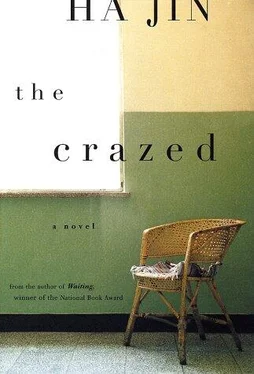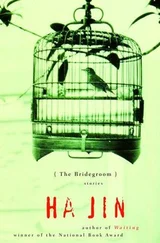To be fair, to many women he wasn’t a bad match. Dozens of them were introduced to him. One was just nineteen, a technician in a gasworks, healthy and normal and without any family burden. Yuman Tan bragged that he had once seen three women in a single night, though we remarked behind his back that he could meet them each just for a few minutes and only in the presence of their parents or friends, under “special chaperonage.” Unlike most marriage-oriented men, he had a two-bedroom apartment, which enhanced his worth considerably. Many newly married couples, without a place of their own, lived separately in their dormitories or at their parents’ homes. Recently the university Party Committee had promised to give every married couple at least a room, which was an urgent measure to prevent young faculty members from leaving for other schools that would offer them better housing. I couldn’t tell whether Weiya also had Yuman Tan’s apartment on her mind. She might, considering she loved painting and must have longed for a room as a studio, which she had never had in her life. In addition, she wanted a home, which a man without housing could hardly give her. Some of the young women who were interested in Yuman Tan might have been impressed by his lectureship and writing, just as conventionally a man’s learning amounted almost to a virtue, a virtue that would lead to a respectable position and yield more income. Besides his study of philology, Yuman Tan published personal essays regularly in reputable journals, so he had a name.
Yet to my mind, Weiya shouldn’t have degraded herself by being one of his choices. It must have been the she-fox Secretary Peng who had set this trap for her. Weiya was too smart not to see through it, but why would she throw herself into the trap?
Approaching her dormitory building, I broke the silence. “Weiya, Ying Peng just wants to destroy you. Please don’t play into her hands.”
“It’s not so simple,” she said thoughtfully.
“Why plunge into the trap she laid for you? You mustn’t do that.”
She looked at me steadily and said, “You’re a good-hearted man, Jian. Sometimes you’re a bit too emotional, perhaps because you’re not experienced in life yet. Meimei’s lucky to have a man like you who hasn’t lost his innocence. My situation is too complicated for me to explain in detail. Please don’t get involved, or you’ll only be hurt. Forget what I said about love just now. Keep in mind that whatever I did in my life, I’ve always been a virgin in my heart and I will always cherish our friendship. Good night.” She turned and strode away.
I was somewhat bewildered by the sentiment she had expressed, which contradicted the pragmatic way she coped with Yuman Tan’s interest. Why did she think me too green? What did this whole thing have to do with the virginity of her heart? Why was she so reluctant to tell me everything?
To be honest, I felt lucky that she had brushed aside my silly offer of myself as a potential man for her and hadn’t taken me to be a jerk. How foolishly I had acted! If she had accepted my self-recommendation, I’d have found myself in a dilemma — having to choose between her and Meimei, whom I couldn’t imagine jilting. Hotheadedness was my main problem; too often I was ruled by my impulses.
The wind was rising, tugging at the trees and the electric wires. It threatened rain, a peal of thunder rumbling in the northwest, followed by slashes of lightning, so I hastened back to my dormitory.
As I was reviewing my notes on political economics, Mr. Yang, sitting on the bed, broke out singing. He sang in a spirited falsetto:
Gallantly we are crossing the Yalu River.
To defend peace and guard our country
Is to protect our hometowns.
The good sons and daughters of China and Korea,
Let us unite closely — to defeat
The vicious American wolves!
To defeat the vicious American wolves!
He bellowed the whole thing out as if he were among a large crowd of people on a platform in a railroad station to see the Chinese People’s Volunteers off to Korea to fight the American army. I wasn’t interested in the song, which had become obsolete long ago. He might just want my attention, but I wouldn’t give him any. Instead, I kept perusing my notes. He seemed frustrated and lapsed into silence.
I had thought of wearing earphones during my shift, but decided not to, afraid of negligence when he really needed me. Besides, once in a while I wanted to listen to him, to glean secrets from his opened mind.
“What are you doing, Jian?” he asked calmly.
“Reading.”
“Good. Have you brought me my books?”
“What books?” I was bewildered, as he hadn’t asked me to bring him anything.
“All those on my bookshelf.”
“Which shelf are you talking about?”
“The one next to my desk.”
“I don’t have the books here.” He was crazy! There were at least a hundred volumes on that shelf in his office.
“Why?” he asked peevishly. “You’re reading, but what am I supposed to do? Sit here idle like a turnip? Go fetch them, please.”
For a moment I didn’t know how to deal with this madness. Dr. Wu, a graying fat-faced man, had instructed Banping and me, “Absolutely no reading material for your teacher.” Even if Mr. Yang were allowed to read, how could I have gone back to get his books while I was on duty here?
“Do you hear me?” he asked.
“Yes.”
“For goodness’ sake, go pronto!”
I made no reply, then hit on an idea. “You’re too tired, Mr. Yang. Let me read to you, okay?” I thought I could use some paragraphs from my notes to beguile him.
“No, I want to study my books by myself. A good scholar mustn’t be a sluggard, letting others read to him, just as you can’t ask others to eat for you. Do you un-der-stand?” He stressed every syllable of the last word.
“I do, but I don’t have any of your books here,” I blurted out.
“What!” he cried with a vacant look on his face. “You mean you’ve lost them? Oh heavens, what can I do without my books?” He broke into tears, genuinely aggrieved.
“Professor Yang, please listen—”
“Oh, how can I live without books! I’m utterly bereft. Why, why did you do this to me?” He started sobbing.
How could I pacify him? Even if I found him a book, he might be too addled to make sense of it. I had only a spiral notebook in hand. Why not appease him with this? I thought. No, he could tell it’s a hoax.
Then I saw the copy of Brecht’s Good Woman of Szechwan lying on the windowsill. I went to pick it up and put it on his palm. “Here’s your book. See now, I haven’t lost any of them. There’s no reason for you to blow up like this.”
He held the book with both hands, his fingers reddish and swollen, with fungus-infested cuticles. Clumsily he opened the soft cover and narrowed his eyes to look at the frontispiece, a photo of the play being staged by a Beijing troupe. Slowly he turned two pages to the foreword written by himself. “Yes, this is my new book,” he said. “The ink smells so fresh it must have just come from the printer. I like the peculiar fragrance of this book.” He paused to look at the page again, as if trying to locate a passage.
Fearful that he might demand another book and throw another tantrum, I sat stock-still. To my astonishment, he lifted his head and began to speak professorially. “Comrades, today we continue our discussion of high Tang poetry. First, let me read you a representative poem by Bo Wang.” He flipped a page and then chanted:
Serrate walls abut the imperial land.
In smoky wind we watch the ferry crossings.
Читать дальше

![Lao Zi - Dao De Jing [Tao Te Ching] (english)](/books/3890/lao-zi-dao-de-jing-tao-te-ching-english-thumb.webp)
![Lao Zi - Dao De Jing [Tao Te Ching] (chinese)](/books/3891/lao-zi-dao-de-jing-tao-te-ching-chinese-thumb.webp)
![Lao Zi - Dao De Jing [Tao Te Ching] (espanol)](/books/3892/lao-zi-dao-de-jing-tao-te-ching-espanol-thumb.webp)







